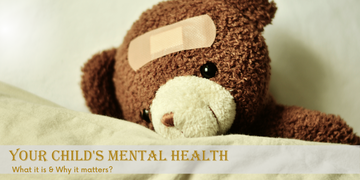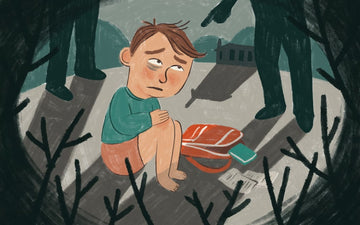
Mental health in general is such a sensitive and important topic to discuss, especially after the events of the last two years. Maintaining a good mental health is as important as maintaining a healthy body and a healthy system! These days, a kid's mental health is easily affected because of the pandemic situation. Good mental health is a sign of positivity and healthy relationships. The environment, the people, the school, all these things are contributors to a kid's mental health including the love they get from their parents. Last two years have not only been tough on adults but have also been very hard on your Children.
So, let’s know what you as a parent can do to nurture your child’s mental health.
How Can I Nurture My Child's Mental Health ? This is one question everyone is asking.

- Help your Child develop Self Esteem so that they feel good about themselves :
Boosting your child’s self-esteem can keep them mentally healthy. Developing their self esteem can help the kids feel good about themselves. Like when, your kid wants to try out something different, tell them they can do it and show trust in them. Appreciate them and praise them whenever they do good. This will boost their confidence and make them do better in whatever they do!
- Listen & respect their feelings:
It’s important for parents to know that it’s okay for your kids to feel sad or angry. You should encourage them to share their feelings with you and be comfortable with them. Communicating with your child and understanding their feelings can tackle a lot of problems.
- Create a Safe & Positive home environment
Home is where kids spend most of their time so make sure you maintain a positive environment at home. Make your home kid-friendly and make time for your kids, play with them. Also, it’s important to keep family issues, marital issues, etc. away from your kids. Limiting their screen time and engaging them in other activities can also be helpful. A safe and positive environment will keep you and kid healthy and happy!
- Help your Child Solve Problems on their own & Ask for Help if required.
Let your kids solve their problems and help them when they ask for it on their own. This will make them believe in themselves and make them confident too! Make them explore the world on their own!
Assessing Your Child & Their Behavioural Patterns.

It is your responsibility to understand the changes in your child’s behaviour because these changes further lead to various problems. Some of the changes can be:
- Changes In Thinking
When children respond negatively or blame themselves for things beyond their control, you can notice the change. If they have negative thoughts, it’s time to know that something is not right.
- Changes in Feelings
Differences in children’s reaction to random things can also help to find out if something is wrong. When kids feel emotional, angry, lonely or rejected, parents should guess that their mental health is not that great.
- Changes in Behaviour
Changes in behaviour can define lots of things like when they often want to be alone, they cry or even show less interest in routine life. It can even become hard for your child to get along with their friends and they can also have trouble sleeping. Well, it’s a sign!
- Physical Changes
The most common physical change you will notice is general pain, like headache, stomach pain, etc. the other thing you can easily notice is tiredness. If your kid feels tired all the time, know that they are not happy with something in their life.
First Steps for Parents

It’s parents' responsibility to help their children tackle mental health problems. Here’s how you can help:
- Start with how they think of themselves
Let your kids express their feelings and listen to them. Ask them how they feel of themselves. What bothers them? What makes them feel good or what will make them feel good? Just know what’s going on in your child’s mind.
- Open a dialogue & help them express themselves
If they hesitate to share their feelings with you, it's the parents' responsibility to initiate a conversation and make the child comfortable. Make sure you create a good and light environment to have such discussions.
- Speaking to your child & setting realistic expectations together Listen and also talk to your child. Let them know you are with them and set some goals, some realistic expectations. Start small but just motivate them to do better slowly.
When to Seek Help & Why is it important?

If your child suddenly starts feeling anxious about meeting new people, feels tired all the time and loses interest in almost everything, know that it’s a red flag and time to seek professional help. Feelings of sadness, anger, depression are very common when your kid’s mental health is not good.
Seeking professional help can be beneficial for the kid but it’s also important for the parents. By doing this, parents get to know more about the problem and it’s solution. Seeking professional help supports the parents who are struggling fixing their kids' mental health. This also ensures that you are not alone in this struggle!
Afterall, taking care of your child is your responsibility, so, always ensure that your child is not facing any problem in their life. Communication is the key to identifying and tackling problems, so do not miss out on that in any case!





